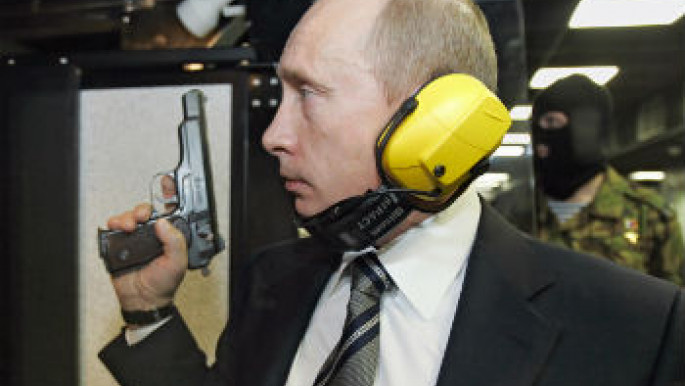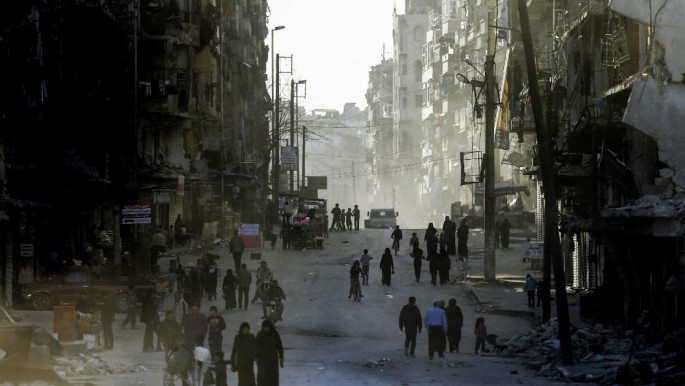Weapons sales: The key to Russia's Middle East agenda
Growing Russian engagement in the Middle East and increased arms sales in the region have led many here to speculate over the Russian agenda.
After almost two decades of relative political obscurity, Russia is back, and has once more set its sights on a global role beyond the classic trade of goods and services with geopolitcally strategic economies. Then again, non-economic elements are almost always present when it comes to such a specific commodity as weaponry.
Opinion on this greatly vary. Subscribers of new cold war rhetoric see Russia as a great threat trying to dismantle the international security order established by the United States. We often heard such remarks from Hillary Clinton and her followers, as well as think-tanks and the media friendly to her.
"I think Russia's objectives are to stymie and to confront and to undermine American power whenever and wherever they can," Clinton told the Brookings Institution in September 2015. But how far Russia's resurgence in the Middle East will ultimately go remains to be seen.
In any case, Russia's arms sales will play an important role in the country's geopolitical plans.
Russia's military exports
The Middle East has been a major arms importing region in recent years, with several states rapidly building up their huge arsenals. And Russia doesn't want to miss out on its slice of market share.
Between 2007 and 2011, arms imports by states in the Middle East rose by 86 percent. In 2012-2016, weapons sales to the region accounted for 29 percent of global imports, according to new data released by the Stockholm International Peace Research Institute (SIPRI).
The main suppliers to the region have been the US and several European states. Russia's position has been much more limited. According to Alexey Khlebnikov, senior editor of Russia Direct, Russia wants to restore its Soviet-era position in the arms market, which drastically declined with the collapse of the USSR.
It would be fair to say, therefore, that Moscow seeks to reach at least parity with US suppliers in the new Middle East arms race.
 |
The US suspended its military aid to Egypt for about two years in reaction to the military coup of 2013 - [this was] undoubtedly a reason for Egypt to diversify its arms suppliers |  |
Russia has long been a supplier of limited volumes of weaponry to Egypt, but it is only in recent years that large deals have been signed. According to Pieter Wezeman, a senior researcher with SIPRI, deliveries of 50 Mig-29M combat aircraft and 46 Ka-50 combat helicopters are to start soon, which will make Russia one of Egypt's largest suppliers.
"These deals have several possible causes, including that that part of Egypt's arsenal was getting old," he told The New Arab. "Egypt reportedly got financial support from Saudi Arabia and the UAE for the procurement, [after] the US suspended its military aid to Egypt for about two years in reaction to the military coup of 2013 - [this was] undoubtedly a reason for Egypt to diversify its arms suppliers."
Russian weapon exports may be used as political leverage.
Nikolay Kozhanov, an analyst formerly of Chatham House, notes "Russian federal law states that strengthening military and political positions abroad is the primary goal of Russian military-industrial cooperation". It is therefore right to assume that Russia will exercise this policy in the Middle East.
"Egypt is a good example here," says Khlebnikov. "The current Egyptian regime desires to modernise its military arsenal with Russian arms and diversifying its military suppliers, while strengthening ties with Moscow, which may be a guarantor of the regime's stability."
In addition, Russia has another valuable client in the neighbourhood. According to SIPRI data, Algeria was the largest arms importer in Africa, with 46 percent of all imports to the region.
Wezeman says Algeria has been one of the major recipients of Russian arms anywhere on the globe for the past ten years, while SIPRI estimates it to be the third-largest recipient of Russian arms from 2007-2016.
"Other suppliers compete in that market too, including China and Germany, but Russia dominates by far, accounting for around 80 percent of Algerian arms imports," Wezeman added. Nevertheless, the relations between the two have not gone much beyond arms deals; relations remain politically neutral.
Elsewhere in the MENA region, however, Russia has been less successful as an arms supplier. Wezeman said that efforts to make deals in Saudi Arabia and the UAE have led to little success - as this is market traditionally dominated by the US and UK, with France following at a distance.
"The UAE has acquired some weapons, in particular air defence systems from Russia, around 2010 - but no major deals have been agreed recently," he noted. Bahrain also ordered some 250 9M133 Kornet/AT-14 anti-tank missiles in 2014, according to SIPRI's data.
It will be hard for Russia to penetrate the GCC market due to such fierce competition.
 |
|
| Putin is happy to play a long game when it comes to arms deals [AFP] |
Syria's arms showroom
Entering the Syrian theatre of war was undoubtedly the turning point for Russian ambitions in the Middle East, as country became one of the key players in the region overnight.
The conflict has become an open air sales exhibition of Russia's military arsenal, proving its efficiency in combat, and reportedly increasing regional interest in acquiring Russian weapons.
The marketing effect of Russia's Syria campaign has been estimated at billions of dollars in prospective contracts, as Moscow advertises some of its best modern weaponry in real combat in Syria, says Khlebnikov.
But Russia has conversely recorded quite the loss in military revenues due to regime change in Libya, and since the beginning of war in Syria.
War broke out in Syria following President Assad's brutal crackdown on protests, and months after Moscow and Damascus signed several major contracts for air defence systems and combat aircraft, says Wezeman.
Some of the defence systems were delivered, but delivery of Russian jet fighters was indefinitely postponed when the war engulfed the country.
"As far as we can judge, Russian arms supplies to Syria consist mainly of ammunition and spare parts," said Wezeman. "Very few major arms have been delivered since 2013, due to Syria not being able to pay for the equipment and/or not able to absorb the weapons under the current circumstances."
| Article continues below photo |
 |
| The Syrian city of Aleppo was left devastated after Russia's fully modernised military assisted Assad's assault on the rebel-held stronghold [Getty] |
Meanwhile, Moscow has been successful in signing several major deals with Iraq, in particular for combat helicopters and air defence systems, he added.
The case of Iran
The special case here is Iran, a country that wants to establish itself as a regional power, but whose growing influence is seen by many as a major threat.
After decades of isolation from the international arms market, Iran is vitally interested in modernising its obsolete military arsenal. Analysts calculate that Iran would need to spend up to $40 billion in the long term to fully revamp its museum-status military.
Some fear that such re-equipment of the country's military would significantly change the balance of power in the Middle East. Moscow will liekly be the first door on which Tehran will knock to kickstart its shopping spree - but this will be no supermarket sweep.
Vasily Kashin, of the Centre for Analysis of Strategies and Technologies in Moscow, explained that the deal still required the agreement of the UN Security Council, where the United States have the power to veto.
According to Kashin, it is absolutely clear that the current US administration will not allow a major arms sale to Iran -so many arms deals will have to wait until 2020, when such limitations may be lifted, depending on the domestic politics of the United States.
Wezeman also expects Russia to accept this long-term strategy, as they agreed with the UNSC resolution that imposes the restrictions, noting that three to four years from contract to delivery is rather normal anyway in major arms deals.
"That's why Russia supplied S-300 air defence systems to Iran in 2016. Having said that, I have not seen any substantive evidence that Iran actually has already signed any major new contracts for such unrestricted military technology," Wezeman told The New Arab.
 |
Technically, we can sell a lot of stuff to Iran even now - and some of this equipment, like long range SAM systems could alter the balance of power |  |
UNSC Resolution 1929 has a number of loopholes, however, allowing the sale of some types of very important military equipment to Iran, Kashin noted. That, for example, includes all types of surface-to-air missile (SAM) systems except for shoulder-mounted weapons; anti-tank guided missiles and other surface-to-surface missiles with a range of less than 25km; anti-air artillery; radar systems; electronic warfare systems; command, control and communication equipment; military logistics vehicles; and transport aircraft.
"Technically, we can sell a lot of stuff to Iran even now - and some of this equipment, like long range SAM systems could alter the balance of power," Kashin added.
Nevertheless, it is arguable if Russia's potential arms sales to Iran could really change the balance of power in the region, said Khlebnikov: "With all the military and financial assistance the US provides to the Gulf states and Israel, it is very doubtful that the power balance might be changed in Iran's favour."
Looking from the geopolitical angle, despite the fact that Russia and Iran share some interests in Syria and in resisting "western dominance" in the region, there is no obvious shared agenda between them.
Russia's Middle East agenda
Besides signing lucrative trade deals, Russia will no doubt attempt to spread its influence in the region, aiming to become an indispensable power-broker. However, it is not clear how potential military contracts could be turned into real geopolitical influence.
Kashin says the Russian goal, above all, is the security of Russia and the security of Russian allies in Central Asia.
"That means that any radical who came from the former Soviet Union to fight in Iraq and Syria must be killed; any organisation which harbours, indoctrinates, trains and assists these individuals must be destroyed; anyone who fights against such organisations must be assisted."
According to Soufan Group data, there are approximately 2400 Islamic State group fighters from Russia, with The New Arab finding Mosul was used as a hub for Russian-speaking militants.
Kashin stresses that Russia is interested in strengthening political regimes which, from the Russian point of view, are effectively fighting armed groups especially dangerous for Russia - IS, Al-Qaeda offshoots etc. That means also increasing these regimes' ability to counter Western military pressure, providing them with systems such as advanced SAMs and supersonic anti-ship missiles.
Khlebnikov agrees, and says that one of Russia's main goals in the region is to counter-balance US influence, as Moscow sees chaos and turbulence in the Middle East as a result of Washington's opportunistic interference in the region.
However, he adds that Russia does not seeks to compete with the US - or to take over its role in the region. "Russian leadership clearly understands that the country does not have the capacity to do so, and neither do they have the desire," he said.
It is more likely, at least in the short-term that Russia will seek only to reinforce its presence in Syria - its only real ally in the region.
Stasa Salacanin is a freelance journalist who has written extensively on Middle Eastern affairs, trade and political relations, Syria and Yemen, terrorism and defence.



